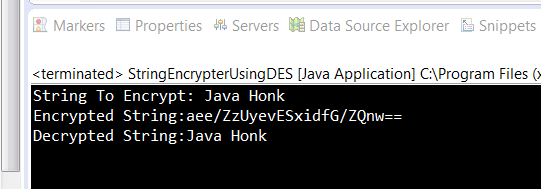DES Encryption Decryption Java
DES encrption algorithim is archetypal block cipher where algorithm takes fixed length string in plain text bits then transforms it data through series of complicated algorithim operations into another cipher text bit string of same length. DES encryption is the block size is 64 bits. DES encryption uses key to customize its transformation so that decryption can performed by application where particular key used to encrypt. Basically the key ostensibly consists of 64 bits and only 56 of these actually used in algorithm. Eight bits have bveen used only for checking parity thereafter discarded. Finally effective key length is 56 bits.
Decryption uses the same structure as encryption but with the keys used in reverse order. Below is sample DES encryiption decrypiton java program where string key been used:
- StringEncrypterUsingDES.java:
package com.javahonk.encryption;
import java.io.UnsupportedEncodingException;
import java.security.InvalidKeyException;
import java.security.NoSuchAlgorithmException;
import java.security.spec.KeySpec;
import javax.crypto.Cipher;
import javax.crypto.NoSuchPaddingException;
import javax.crypto.SecretKey;
import javax.crypto.SecretKeyFactory;
import javax.crypto.spec.DESKeySpec;
import javax.crypto.spec.DESedeKeySpec;
import sun.misc.BASE64Decoder;
import sun.misc.BASE64Encoder;
public class StringEncrypterUsingDES {
public static final String DESEDE_ENCRYPTION_SCHEME = "DESede";
public static final String DES_ENCRYPTION_SCHEME = "DES";
public static final String DEFAULT_ENCRYPTION_KEY = "This is a fairly long phrase used to encrypt";
private KeySpec keySpec;
private SecretKeyFactory keyFactory;
private Cipher cipher;
private static final String UNICODE_FORMAT = "UTF8";
public StringEncrypterUsingDES( String encryptionScheme ) throws EncryptionException
{
this( encryptionScheme, DEFAULT_ENCRYPTION_KEY );
}
public StringEncrypterUsingDES( String encryptionScheme, String encryptionKey )
throws EncryptionException
{
if ( encryptionKey == null )
throw new IllegalArgumentException( "encryption key was null" );
if ( encryptionKey.trim().length() < 24 )
throw new IllegalArgumentException(
"encryption key was less than 24 characters" );
try
{
byte[] keyAsBytes = encryptionKey.getBytes( UNICODE_FORMAT );
if ( encryptionScheme.equals( DESEDE_ENCRYPTION_SCHEME) )
{
keySpec = new DESedeKeySpec( keyAsBytes );
}
else if ( encryptionScheme.equals( DES_ENCRYPTION_SCHEME ) )
{
keySpec = new DESKeySpec( keyAsBytes );
}
else
{
throw new IllegalArgumentException( "Encryption scheme not supported: "
+ encryptionScheme );
}
keyFactory = SecretKeyFactory.getInstance( encryptionScheme );
cipher = Cipher.getInstance( encryptionScheme );
}
catch (InvalidKeyException e)
{
throw new EncryptionException( e );
}
catch (UnsupportedEncodingException e)
{
throw new EncryptionException( e );
}
catch (NoSuchAlgorithmException e)
{
throw new EncryptionException( e );
}
catch (NoSuchPaddingException e)
{
throw new EncryptionException( e );
}
}
public String encrypt( String unencryptedString ) throws EncryptionException
{
if ( unencryptedString == null || unencryptedString.trim().length() == 0 )
throw new IllegalArgumentException(
"unencrypted string was null or empty" );
try
{
SecretKey key = keyFactory.generateSecret( keySpec );
cipher.init( Cipher.ENCRYPT_MODE, key );
byte[] cleartext = unencryptedString.getBytes( UNICODE_FORMAT );
byte[] ciphertext = cipher.doFinal( cleartext );
BASE64Encoder base64encoder = new BASE64Encoder();
return base64encoder.encode( ciphertext );
}
catch (Exception e)
{
throw new EncryptionException( e );
}
}
public String decrypt( String encryptedString ) throws EncryptionException
{
if ( encryptedString == null || encryptedString.trim().length() <= 0 )
throw new IllegalArgumentException( "encrypted string was null or empty" );
try
{
SecretKey key = keyFactory.generateSecret( keySpec );
cipher.init( Cipher.DECRYPT_MODE, key );
BASE64Decoder base64decoder = new BASE64Decoder();
byte[] cleartext = base64decoder.decodeBuffer( encryptedString );
byte[] ciphertext = cipher.doFinal( cleartext );
return bytes2String( ciphertext );
}
catch (Exception e)
{
throw new EncryptionException( e );
}
}
private static String bytes2String( byte[] bytes )
{
StringBuffer stringBuffer = new StringBuffer();
for (int i = 0; i < bytes.length; i++)
{
stringBuffer.append( (char) bytes[i] );
}
return stringBuffer.toString();
}
public static class EncryptionException extends Exception
{
private static final long serialVersionUID = 1L;
public EncryptionException( Throwable t )
{
super( t );
}
}
public static void main(String args[]) throws EncryptionException{
StringEncrypterUsingDES encryption = new StringEncrypterUsingDES(DES_ENCRYPTION_SCHEME);
String target = "Java Honk";
String encrypted = encryption.encrypt(target);
String decrypted = encryption.decrypt(encrypted);
System.out.println("String To Encrypt: " + target);
System.out.println("Encrypted String:" + encrypted);
System.out.println("Decrypted String:" + decrypted);
}
}
- Output:
- For more information about its algorithim please visit here

